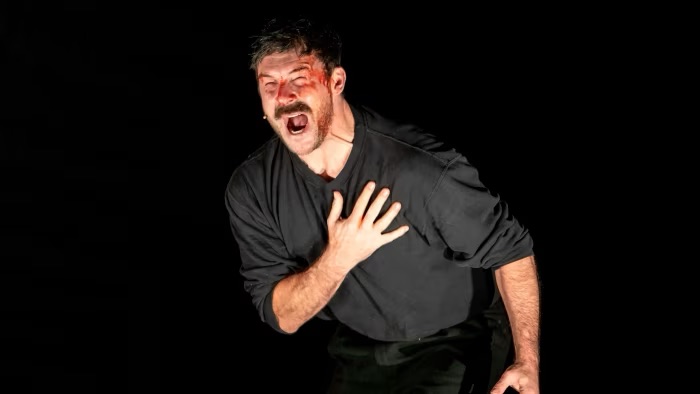
Alan Bleasdale’s BOYS FROM THE BLACKSTUFF
by James Graham
directed by Kate Wasserberg
Garrick Theatre, London – until 3 August 2024
https://nimaxtheatres.com/shows/boys-from-the-blackstuff/
There’s something both invigorating and deeply depressing about watching this blistering stage adaptation of Alan Bleasdale’s seminal 1980s TV drama and realising not only does it still feel relevant but that in fact it resonates more powerfully now than it would have done, say, a decade ago. Make no mistake, this is a deeply Left Wing piece of work, filled with humanity and rage, despair and vitality.
Perhaps it could only have sprung from a city that had the guts ripped out of it by the Tories under Thatcher, and Bleasdale’s all-too-credible tale of working class Liverpudlians doing their best not to get crushed by a societal system not designed to help them, now screams like a clarion call to a nation once again decimated by a bunch of uncaring, dishonest elitists. That this coruscating piece of theatre is playing in the West End as the UK heads into a General Election feels particularly apposite.
Originally commissioned by, and produced at, Liverpool’s Royal Court before a brief stint at the National, Boys From The Blackstuff arrives in the West End like a blast of fresh air. Kate Wasserberg’s staging, performed in front of a projected backdrop of the perpetually rippling waters of the Mersey, has an appropriately warm-hearted community theatre feel, with the actors trundling on set pieces and furniture while forbidding-looking rusty metal frames pivot and position overhead, and is perfectly matched by James Graham’s episodic but bold adaptation of the television scripts. It’s scrappy and a little rough around the edges, but it has tremendous focus, irresistible Scouse energy, moments of surprising lyricism, and a raw, ferocious theatricality that captivates and soars.
Unless you’ve a working knowledge of the original series, it’s hard to know where Bleasdale ends and Graham begins, although the latter adds a heartbreaking coup de theatre concerning the children of one of the leading characters that leaves us winded. As writers they share a flair for channelling politics and history down through the lived experience of individuals we can identify with. If you spend the first half of the stage play marvelling at the ongoing relevance of the themes, in act two the drama moves into a zone where you find yourself caring desperately about the people. The writing is terse, bleakly funny, sometimes overtly sentimental, and ultimately desperately moving. The conflicts between these flawed, angry, frightened people makes for riveting theatre but feels like a challenge to humanity at large to just do better.
It isn’t perfect: the bond between the tarmac-laying men (hence the title) drawing the dole while still taking on manual labour in an attempt to makes ends meet, isn’t as strongly felt as it might be. The storytelling is a little uneven, and, from a design perspective, the wigs for the female characters are pretty awful, while having a young actress playing, however skilfully, a much older woman smacks of drama school end-of-year shows.
These are small cavils though at a rousing production that evokes time and place with such vivid specificity and bold stagecraft. Movement director Rachael Nanyojo’s striking work reaches its apotheosis with the slo-mo ballet, at once brutal and graceful, where the police violently take down poor, mentally incapacitated Yosser (Barry Sloane, inheriting Bernard Hill’s iconic “gizza job” with stunning commitment). Amy Jane Cook’s gritty set, Ian Scott’s lighting and Jamie Jenkin’s video design all contribute to the show’s devastating overall impact. The humour is tart, dark and much needed in what could otherwise be a night of unremitting depression.
Sloane is more physically striking than one might expect somebody in such dire straits as Yosser, abandoned by his wife and apparently unemployable for any length of time, to be, but he nails the swagger, aggression and broken masculinity of a human whose life has spiralled so far away from what he presumed it would be that he barely recognises himself. It’s a tremendous performance. As his pal Chrissie, equally impecunious but managing to hang on to his family…for now, Nathan McMullen delivers a flawless, heartcatching account of a genuinely decent man (“you’re too good!” Yosser constantly rails at him) and his scenes of marital strife with despairing wife Angie (Lauren O’Neill, thrillingly impassioned) are electrifying.
Philip Whitchurch is brilliant as frail, older George, haunted by memories of a more affluent, less desperate Merseyside, and there are potent contributions from Mark Womack, Aron Julius and George Caple as men old before their time and desperately clinging on to what’s left of their sanity and dignity. There’s excellent multi-rolling work from Dominic Carter, Jamie Peacock and Hayley Sheen as a variety of clerks, officials, priests and family members who emerge from the nightmarish landscape to challenge or ameliorate the struggling protagonists’s lives.
Male mental health is more widely discussed than it was forty years ago, so the characters, but especially stricken Yosser, read slightly differently now than they did when the tv series first appeared. Wasserberg’s production wisely doesn’t comment on this but allows the situations and the people to speak for themselves. The result is a piece of theatre that pays tribute to its epoch-making source material but which packs one hell of an emotional punch of its own. See it, and come out simultaneously angered by its resonances and exhilarated by its theatrical bravura. On screen and now on stage, Boys From The Blackstuff proves unforgettable. Bleasdale’s legacy is vindicated.
Leave a comment